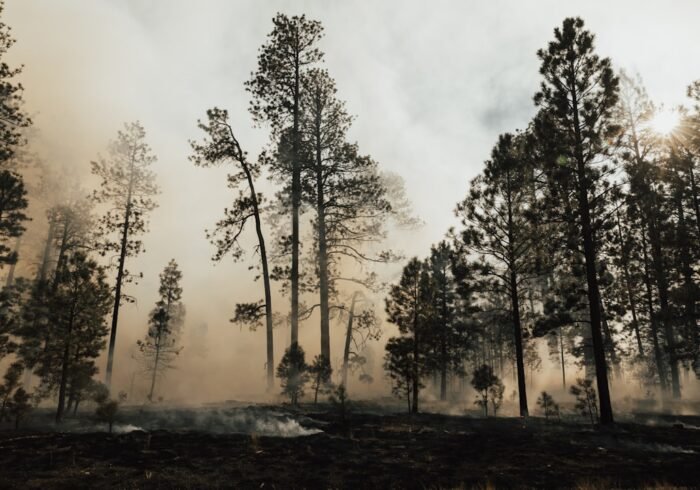A Complete Guide to Understanding Climate Change Skeptics Skeptics are a broad category of people who disagree with the scientific consensus regarding climate change and its human-caused causes. This skepticism may originate from a number of things, such as individual convictions, political connections, and financial interests. Although the vast majority of climate scientists concur that human activity—specifically, the burning of fossil fuels—is a major contributor to global warming, skeptics frequently contest this claim. They may argue that climate change is a natural phenomenon rather than a man-made crisis, or they may cast doubt on the accuracy of climate models.
Key Takeaways
- Climate change skeptics often question the scientific consensus on climate change and its causes, leading to skepticism and denial of its existence.
- Common arguments against climate change include claims that the Earth’s climate has always changed, that there is no consensus among scientists, and that natural factors are the primary drivers of climate change.
- Scientific evidence supporting climate change includes rising global temperatures, melting ice caps, extreme weather events, and changes in precipitation patterns, all of which are consistent with the predictions of climate models.
- Refuting misinformation and misinterpretations involves addressing and correcting false claims and misunderstandings about climate change, such as the idea that the Earth is not warming or that human activities are not contributing to it.
- The fossil fuel industry has played a significant role in funding and promoting climate change denial, often to protect their financial interests and avoid regulation.
- Addressing the economic and political motivations of climate change skeptics involves understanding the influence of industry lobbying, political ideology, and the potential impact on profits and power.
- Taking action on climate change is crucial to mitigate its impacts, protect vulnerable communities, and transition to a sustainable and low-carbon future.
- Debunking climate change myths and moving forward requires promoting accurate information, supporting renewable energy, and advocating for policies that reduce greenhouse gas emissions and promote environmental sustainability.
The discussion of environmental policy and action is made more difficult by the presence of climate change skeptics in public discourse. Their opinions have the power to increase skepticism among the populace, which could delay the resolution of climate-related problems. To promote productive solutions to one of the most important issues of our day, it is essential to comprehend the reasons & arguments put forth by these skeptics.
Skeptics frequently use a range of justifications to back up their denial of climate change’s existence. Citing historical occurrences like the Little Ice Age or the Medieval Warm Period as proof that present-day changes are a part of a natural cycle, one common assertion is that climate has always fluctuated naturally. They contend that modern warming cannot be exclusively ascribed to human activity because the Earth has seen notable temperature fluctuations long before industrialization. The alleged errors in climate models are the subject of yet another frequent debate.
Critics claim that these models produce inflated projections of future warming because they are unreliable & unduly dependent on initial conditions. They frequently cite examples of models’ inability to correctly forecast short-term climate variations as evidence that long-term projections should be regarded with caution. This kind of thinking has the potential to give people a false sense of security, which would undermine the need to address climate change immediately. The reality of climate change and its human-induced causes are supported by a substantial body of scientific evidence, which stands in sharp contrast to the assertions of skeptics.
| Argument | Response |
|---|---|
| Climate change is just a natural cycle | Scientific evidence shows that human activities are the primary cause of the current global warming trend. |
| There is no scientific consensus on climate change | Over 97% of climate scientists agree that climate-warming trends over the past century are very likely due to human activities. |
| Climate models are unreliable | Climate models have been validated and are essential tools for understanding the potential impacts of climate change. |
| Global warming has stopped | Multiple independent datasets confirm that the Earth’s surface temperature has continued to rise over the past century. |
A preeminent expert on climate science, the Intergovernmental Panel on Climate Change (IPCC), has repeatedly stated that since the late 19th century, global temperatures have increased dramatically, mostly as a result of increased greenhouse gas emissions from human activity. Ice core samples have demonstrated a direct correlation between historical temperature changes and atmospheric CO2 concentrations, supporting the well-established relationship between rising carbon dioxide levels and global temperatures. Also, the effects of climate change on diverse ecosystems and weather patterns have been shown by numerous studies. For instance, climate change has been connected to an increase in the frequency and severity of extreme weather events like heatwaves, droughts, and hurricanes. Changes in plant blooming seasons and wildlife migration patterns have also been noted by scientists, providing more evidence that ecosystems are adapting to shifting climatic conditions.
The abundance of evidence highlights the pressing need to take action in order to lessen the effects of climate change. Fostering an informed public requires addressing climate change misinformation. To support their claims, many skeptics use selectively chosen data or incorrect interpretations of scientific discoveries. Without considering the larger context offered by decades or centuries of data, they might, for instance, point to transient temperature variations as proof against long-term warming trends. The fact that climate science works with long-term trends rather than isolated occurrences must be emphasized. Skeptics also frequently misrepresent the scientific consensus on climate change.
It is true that disagreement and skepticism are necessary for scientific research, but the vast majority of climate scientists—more than 97%—agree based on in-depth analysis and peer-reviewed research. This consensus is based on thorough analysis and validation of data from several disciplines and is not just an opinion. Climate action advocates can successfully combat false information and advance a more accurate understanding of climate science by elaborating on these points. The fossil fuel industry contributes significantly to the persistence of skepticism about climate change. Historically, big oil & gas firms have made significant investments in campaigns that cast doubt on the veracity of global warming & undermine climate science.
These initiatives frequently include financing think tanks, lobbying, & public relations campaigns that aim to cast doubt on scientific discoveries. In order to safeguard their interests in the extraction and consumption of fossil fuels, these corporations present climate change as a controversial topic rather than an undeniable reality. There are moral questions regarding the integrity of the public conversation on climate change because of this relationship between industry and skepticism. When disinformation campaigns are fueled by financial interests, it gets harder for the public & policymakers to separate fact from fiction.
It’s critical to acknowledge this influence in order to comprehend why some people maintain their skepticism in the face of overwhelming scientific evidence for climate change. Climate change skepticism is frequently motivated by political and economic factors. Recognizing climate change has economic ramifications. For many people, especially those working in fossil fuel-dependent industries, admitting climate change can have serious financial repercussions, such as job losses and more regulations.
This apprehension may result in opposition to embracing scientific discoveries & promoting essential policy modifications. Beliefs about climate change & political affiliations. Beliefs regarding climate change can also be influenced by political affiliations; politically inclined people may reject scientific consensus because they believe it threatens their economic interests or values. Strategies for Effective Communication.
Developing successful communication techniques that appeal to skeptics requires an understanding of these motivations. Divides can be healed by having productive conversations that highlight the possible advantages of switching to renewable energy sources while addressing economic concerns. Advocacy groups can promote a more inclusive dialogue about solutions by presenting climate action as a chance for innovation and job creation rather than a hardship. It is essential to address climate change in order to protect the planet’s future and guarantee a sustainable environment for future generations.
The ramifications of inaction are severe: biodiversity loss puts ecosystems vital to human survival in jeopardy, extreme weather events disrupt livelihoods, and rising sea levels threaten coastal communities. By giving climate action top priority right now, society can reduce these risks and work toward a future that is more resilient. Also, combating climate change offers a chance for economic expansion via the advancement of renewable energy sources & green technologies.
Clean energy investments not only lower greenhouse gas emissions but also generate employment in developing sectors like wind & solar. Making the shift to a low-carbon economy can improve energy security, lessen reliance on fossil fuels, and spur innovation. As a result, addressing climate change head-on presents both an economic and environmental opportunity. As society struggles with the intricacies of climate change skepticism, it is critical to dispel common misconceptions that impede advancement. It’s a common misconception that individual acts won’t make a big difference in the fight against climate change, but when scaled across communities and countries, group efforts can produce significant changes.
Promoting sustainable behaviors on a personal and systemic level can help build support for more extensive legislative changes. Progress necessitates a dedication to climate science education and awareness-building. The development of scientific literacy and critical thinking abilities can enable people to interact with complicated problems more successfully. Also, establishing forums for candid discussion between advocates and skeptics can promote cooperation and understanding in the pursuit of common objectives.
In conclusion, combating skepticism about climate change requires a multipronged strategy that incorporates both scientific data and compassionate communication techniques. Through comprehending the reasons behind skepticism and actively participating in productive discourse, society can endeavor to surmount obstacles to action and cultivate a shared dedication to addressing climate change for a sustainable future.



